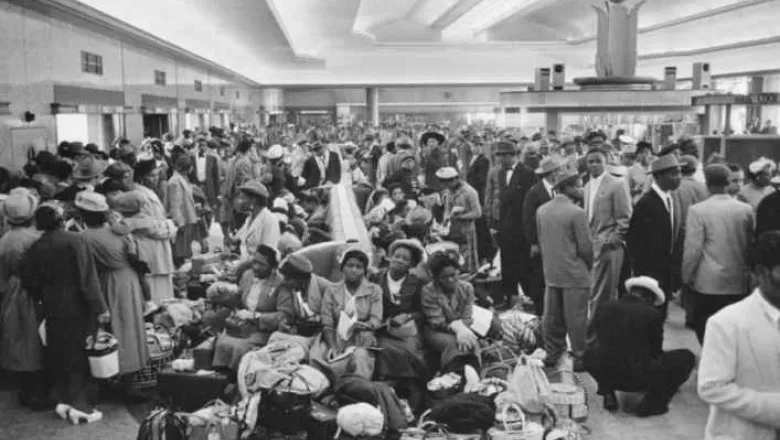The judicial review, is important for the reason that for many victims of the Windrush scandal, effective access to meaningful and fair compensation, and access to legal representation, are one and the same. Without the latter, the exercise in restorative justice in the form of the Windrush Compensation Scheme, will remain an empty one for far too many victims, some of whom have now already passed away.
Van Ferguson, Solicitor, Southwark Law Centre.
13 February 2024
Research reveals structural weaknesses in Windrush Compensation Scheme remain as legal challenge of refusal to provide legal aid to victims is to be heard
Comparative research carried out by King’s Legal Clinic has highlighted the continued failure by the Windrush Compensation Scheme (WCS), to deliver fair and accessible compensation to victims of the Windrush scandal.

The research comparatively evaluated the structure and performance of the WCS to the Lambeth Children’s Home Redress Scheme, the Horizon Shortfall Scheme and the proposed Infected Blood Compensation Scheme. All the compensation schemes explored involved historic wrongs perpetrated by the state, profound suffering and harm to its victims, delays and/or failures by the Government to act thereby compounding the wrongs. Whilst the report found weaknesses in all compensation schemes, there were significant structural failings present in the WCS which require urgent reform.
Key Research Findings
Statistically the WCS has the lowest success rate and highest refusal rate for applicants, with only 22% (1,641) of those applying receiving compensation and 53% of initial applications being refused. In comparison;
- Lambeth Children’s Home Redress Scheme, 79% of applications were successful, with 8% refused.
- Horizon Shortfall Scheme 73% of applications were successful with 17% refused.
The low success rate of the WCS raises concern as 16,744 applicants have had their immigration status confirmed though the Windrush Scheme, this is a separate scheme to the compensation scheme and relates to confirming immigration status and British citizenship. This suggests that only 10% of applicants who secured declaratory immigration status have received a compensation payment.
A range of factors were identified as potentially contributing to the low success rate of the WCS:
- The WCS was the only scheme where the perpetrator of the original harm, the Home Office, is solely responsible for the initial decision making and subsequent first level review decision. All other schemes engaged or proposed to engage external lawyers and independent experts in the decision-making process.
- Aspects of the WCS eligibility requirements, which required a correct determination of immigration status, appeared more complex than some of the other compensation schemes explored.
- Over the years, a number of independent reports have raised serious concerns about the competency of Home Office caseworkers to determine compensation claims and a ‘culture of disbelief and carelessness’ in the Home Office. The report found these failings were present in the application of an elevated standard of proof applied beyond the stipulated balance of probabilities threshold. Comparatively the approach to the standard of proof and evidence more generally in the other schemes was found to be fairer than the WCS.
- The WCS was found to have limited independent redress available compared to the other schemes.
- Significantly, all compensation schemes other than the WCS made provision for legal advice and representation for victims. Legal aid is presently not available and is the subject of an on-going legal challenge by Southwark Law Centre.
Urgent Reform needed for Windrush Compensation Scheme
The report repeats the historic calls for reform and makes five recommendations calling for:
1. The establishments of an independent arm’s length body to process applications.
2. A review of the approach to loss, causation, and evidential burden.
3. Funded legal advice and representation to applicants.
4. A right of appeal to an Independent Appeal Panel.
5. A review of the WCS, involving beneficiaries, and re-commitment by the Government to wider systemic reform of the Home Office.
The report was prepared by Shaila Pal, Director of King’s Legal Clinic and Senior Lecturer and Elly Nowell, Research Assistant.
Legal challenge to refusal to provide Windrush victims legal aid
Southwark Law Centre is challenging a decision by the Legal Aid Agency to refuse its client legal aid under the exceptional case funding regime. An exceptional case determination must be made where a failure to do so would breach, or risk breaching, an applicant’s human rights. The Legal Aid Agency position is that WCS claims do not engage Article 6 (Human Rights Act (1998)) and Article 1 of Protocol No 1, and that Article 8 is not fully engaged and/or is not interfered with. The Legal Aid Agency do not think victims of the Windrush scandal need legal assistance to prepare a WCS claim or engage in the process.
As part of the Windrush Justice Clinic, King’s students Laurent Sammouri, Aaliyah Lindo and Aaron Rajesh carried out preliminary legal research to assist the challenge in December 2022.
Van Fergusson, solicitor at Southwark Law Centre, considers the decision important for victims of the Windrush scandal.
The case will be heard on the 20th and 21st February 2024 at the Royal Courts of Justice.

